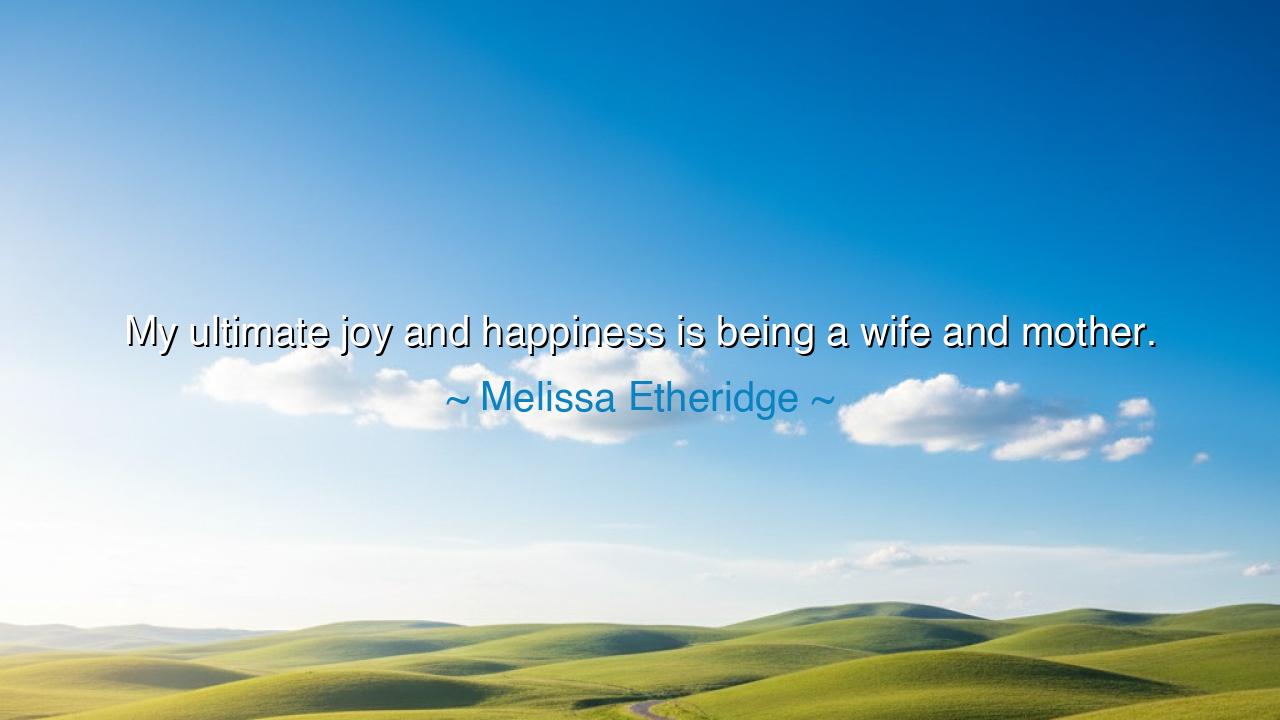
My ultimate joy and happiness is being a wife and mother.






The words of Melissa Etheridge, when she said, “My ultimate joy and happiness is being a wife and mother,” are not merely a confession of love — they are a revelation of purpose, spoken from the heart’s deep well. In a world that often measures worth by fame, fortune, and applause, her words return us to the sacred hearth of life — to love, family, and the quiet power of devotion. In them, one hears the voice of the ancients, echoing through time, reminding us that joy is not found in conquest, but in connection. The world may marvel at the song she sings upon the stage, but her truest song is the one sung softly at home, in the laughter of children and the enduring partnership of love.
In ages long past, the poets and sages understood this truth well. They spoke of the hearth as the center of the world — the fire that never dies, where the soul of the household burns. It was said that when the fire of home is tended, the gods themselves draw near. For to be a wife is not merely to share life, but to bind oneself in faith and compassion; to be a mother is not only to bear children, but to nurture souls and shape destinies. The ancients saw in the family the reflection of the cosmos — husband, wife, and child forming a harmony as perfect as the sun, moon, and stars. Thus, Etheridge’s words are not modern sentiment, but timeless truth: that the greatest joy is not in being admired, but in being needed, loved, and trusted.
Consider the story of Penelope, wife of Odysseus, who waited twenty years for her beloved’s return. She was surrounded by wealth, by suitors, by the promise of ease — yet her joy lay not in those things. Her heart was set on the bond she had forged, on the family she cherished. In her steadfastness, she became a symbol for all time of the strength of love and the virtue of devotion. She ruled her home with wisdom and faith, and when Odysseus at last returned, their reunion was not merely of bodies, but of spirits that had endured trial and distance. In her quiet endurance, we see the reflection of Etheridge’s truth: that joy is found not in power, but in presence.
The role of motherhood, too, has ever been revered as a sacred calling. The mother is the first teacher, the first comforter, the first mirror in which a child sees the world. She is the architect of character, the silent guardian of futures. In her arms, kingdoms are dreamed and hearts are healed. To call this her “ultimate joy” is not to diminish her art or her talent — it is to recognize that all the songs of the earth find their deepest harmony in love given and received. The ancients would have said that a mother’s joy is the joy of creation itself — the same joy that moved the gods to shape the stars.
Yet, there is strength in Etheridge’s words — a heroic strength, quiet but unyielding. For to love deeply, to nurture faithfully, to commit one’s heart to others, is no small task. It demands courage greater than that of warriors, patience deeper than that of kings. The love of a wife and mother is not the soft surrender of comfort, but the noble act of giving one’s life in daily service, of finding beauty in the simple and the sacred. In her statement lies both gentleness and power — a harmony the ancients called sophrosyne, the balance between love and wisdom.
From these words, we learn that true happiness is not found in the outer world but in the inner life — in the relationships that root us, in the tenderness that teaches us to care. Let no one think it small to find joy in family, for from such joy the world is renewed. Every generation that learns to love well stands upon the shoulders of those who loved before them. To build a home is to build eternity, one moment of kindness at a time.
So, dear soul, take this teaching and keep it close. Cherish your loved ones, for they are the garden where your spirit blooms. Tend your relationships as you would tend a sacred flame — with patience, gratitude, and daily care. Do not chase the illusions of fame or fleeting pleasure; seek instead the enduring joy of giving yourself wholly to those you love. In this, you will find what Melissa Etheridge found: that the truest form of greatness is not in being celebrated, but in being beloved — and that the heart’s highest song is sung not before crowds, but around the fire of home.






AAdministratorAdministrator
Welcome, honored guests. Please leave a comment, we will respond soon